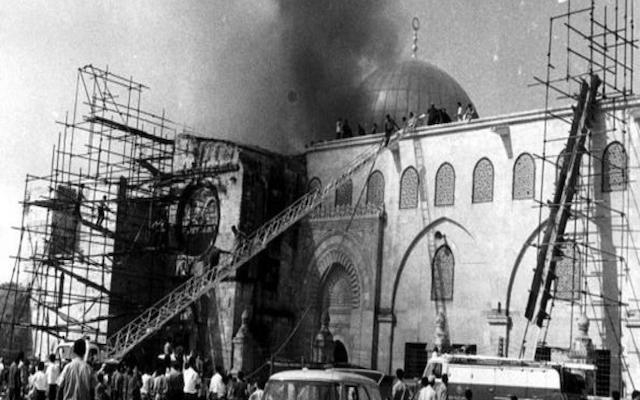On August 21, 1969, Al-Aqsa Mosque in Jerusalem witnessed a calamitous event when Denis Michael Rohan, a recent immigrant to Israel from Australia, set the revered site ablaze. Having moved to Israel mere months before this incident, Rohan's background was far removed from the assumptions of many.
While residing in Israel, Rohan worked at Kibbutz Mishmar Hasharon, located in the heart of the Sharon region. Immersing himself in his new surroundings, he devoted significant time to learning Hebrew. However, not long after his arrival, the 28-year-old began exhibiting unusual behavior. He asserted that he could hear voices and, contrary to his actual Christian background, he proclaimed himself to be Jewish. While he was indeed a member of the Church of God, a modest-sized church from California, his sudden and profound interest in the Al-Aqsa Mosque and the broader Temple Mount complex was puzzling to many.
The riots were orchestrated under the pretext of marking the 52nd anniversary of an arson attack on the Al Aqsa Mosque by Australian Denis Rohan. The Christian extremist was deemed insane by an Israeli court and admitted to a psychiatric institution.https://t.co/fOcV1LxT0F
— HonestReporting (@HonestReporting) August 22, 2021
His preoccupation with the belief in the imminent advent of the messiah was deeply intertwined with his fascination for the sacred site. Such was the frequency of his visits to the Temple Mount that the guards there recognized him.
The fateful morning saw Rohan pouring kerosene through a keyhole of the mosque, setting it alight with a match. The inferno severely damaged the ancient pulpit, necessitating years of restoration. Within a span of two days post the incident, Rohan was identified, apprehended by Israeli officials, and faced arson charges. During his trial, he defended his actions by declaring that he aimed to clear the ground beneath the mosque to pave the way for the third Jewish Temple, a precursor for the messiah's arrival. He believed, as he shared with the court, that God had chosen him for this mission. His delusions extended to seeing himself as the destined king of Jerusalem.
Annually the PA mythologizes the 1969 arson at Jerusalem's Al-Aqsa Mosque done by "a Jew called Rohan" "on behalf of the Jewish religion”. The truth is the guy was a disturbed evangelical Aussie Christian. But the PA knows lies serve them better than truthhttps://t.co/MBt3mB2pLj
— This Ongoing War (@ThisOngoingWar) September 9, 2020
Given the evident signs of his unstable mental state, Rohan was repatriated to Australia on the grounds of insanity, where he spent the remainder of his life.
The repercussions of this single act resonated for years. Many in the Muslim community propounded theories that Rohan's actions were not solitary but were orchestrated by Israeli authorities. Although some Israeli officials refuted claims, primarily made by Palestinians and certain sections of the Muslim community, that Rohan was Jewish, many preferred not to engage, given the clarity of Rohan's Christian faith.
Since the 1969 al-Aqsa arson attack, disinformation campaigns in MidEast media outlets have served to stir up public passions & incite violence against Jews & Israel. This year was again a missed opportunity to provide an accurate portrayal of history: https://t.co/buVjxtWMq2 pic.twitter.com/OjpHjfu4ci
— Jonathan Greenblatt (@JGreenblattADL) September 13, 2022
Nonetheless, certain Palestinian narratives continue to allege Israeli involvement in the arson and downplay Rohan's role. Contrarily, Israeli firefighter accounts from the day emphasize that the aggression shown by some Palestinians present at the site hindered their firefighting efforts.


